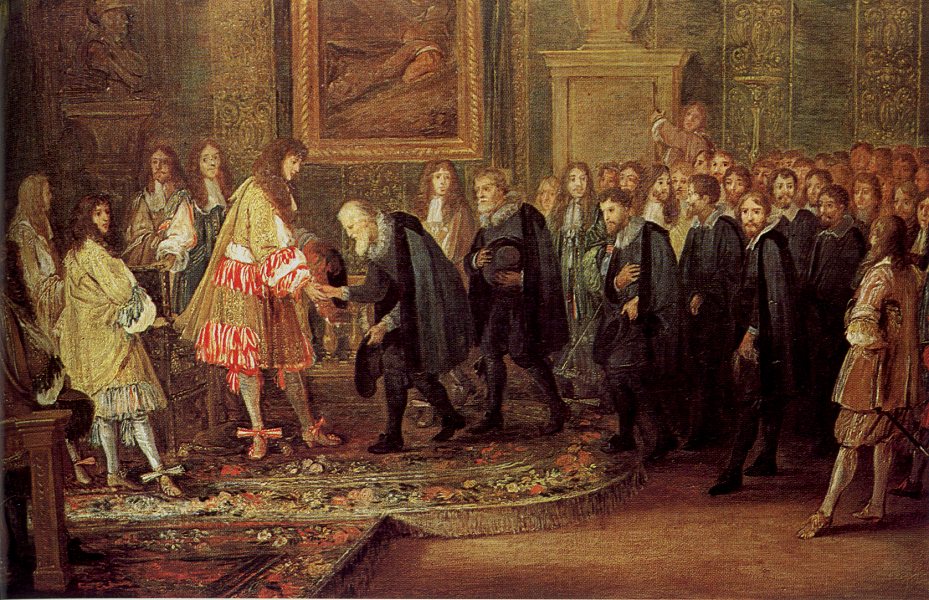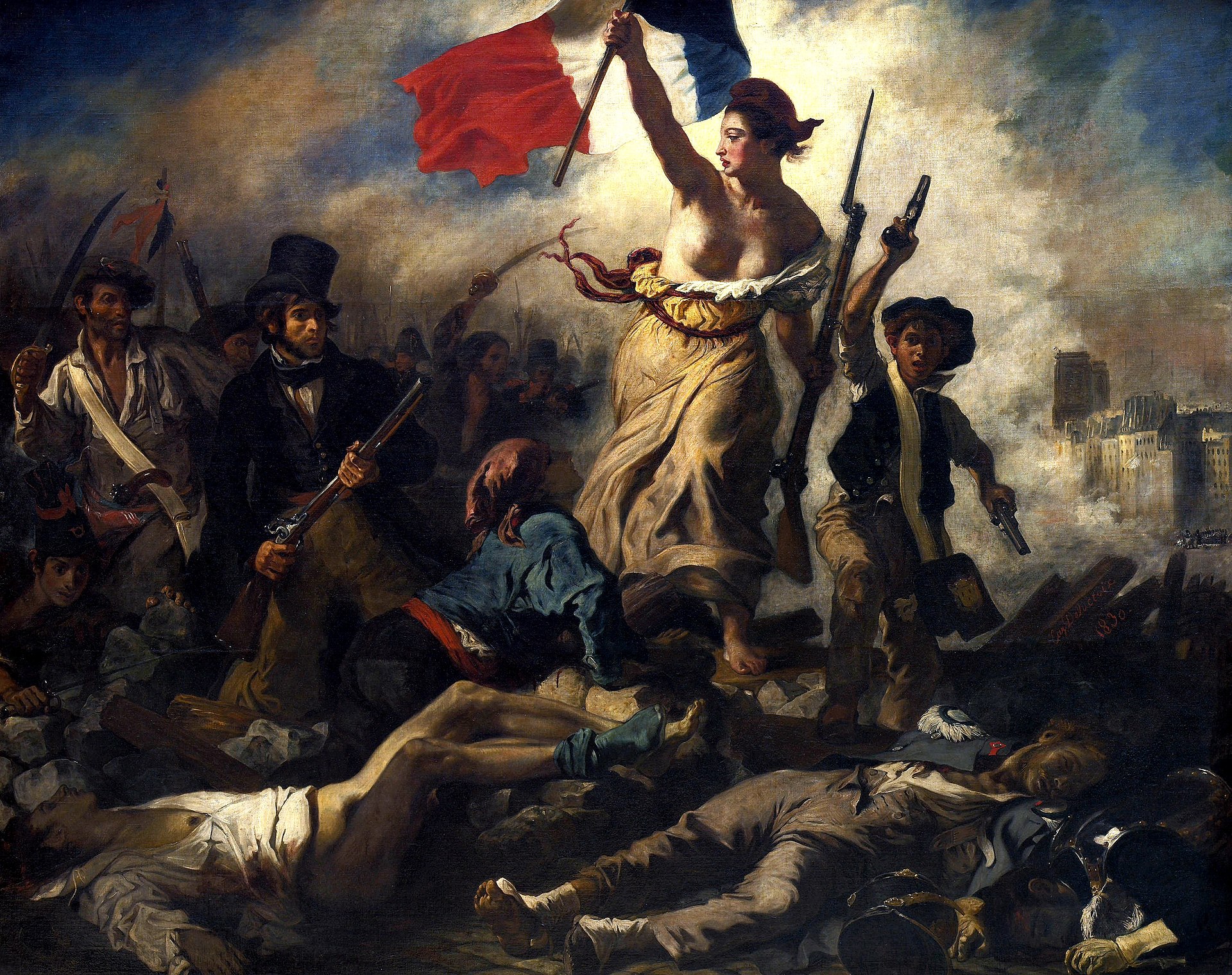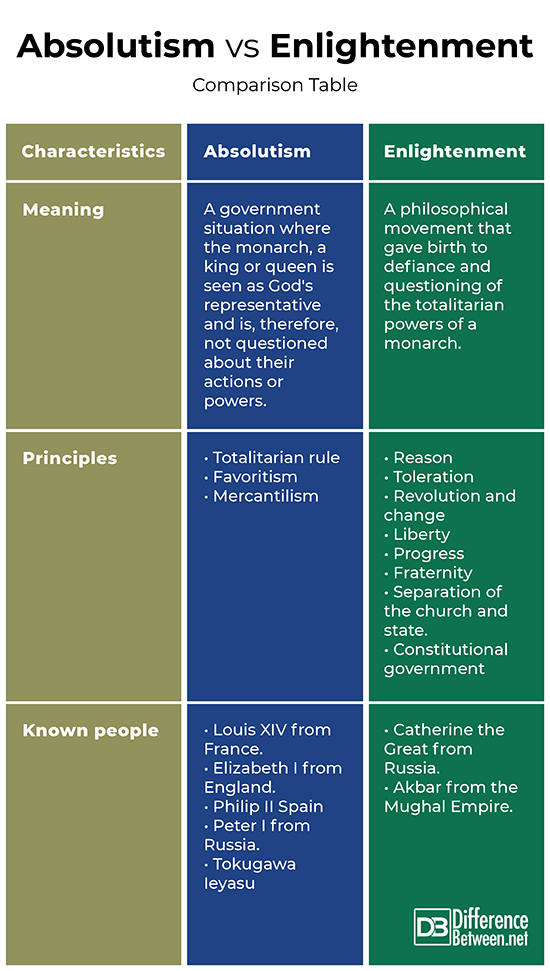Difference Between Absolutism and Enlightenment
The two terms refer to government fundamentals that go back to the 18th and 19th Centuries. They revolve around the conduct and policies of various European supreme monarchs. The two have in some instances been used together to refer to such monarchs even though they also have distinct meanings on their own.
What is Absolutism?
Absolutism refers to a situation in which a monarch holds absolute principles, powers, and authorities in theological, political, and philosophical matters. In such a case, the authority of the monarch is not restricted by any written law, customs or legislation. Instead, such monarchies are hereditary, and that applies to the authorities they hold too.
Characteristics of Absolutism
- The leadership title is inherited.
- The decisions of the leader are final.
- The leader controls the lawmaking bodies and internal and foreign affairs.
- The people have no voice.
What is Enlightenment?
This was an age of reason during when a philosophical movement took place mainly in Europe and later in North America. This happened in the18th Century, otherwise referred to as the Century of Philosophy. The movement involved individuals who believed they were illuminating the human culture and intellect after the Middle Ages, which they termed as the dark age.
Enlightenment had different principles from absolutism. Most of the principles undermined the authority of a monarch and monarchy. The church on its part paved the way for the political revolutions that arose.
Difference Between Absolutism and Enlightenment
Meaning of Absolutism vs. Enlightenment
Absolutism refers to the situation whereby an authority or monarchy holds total powers, principles, and authorities. Obedience to such a leader is seen as obedience to God since the leader is taken as God’s representative on earth.
On the contrary, enlightenment refers to a philosophical movement where the beliefs undermine the ideas and authority of a monarchy.
Ideas and Principles of Absolutism vs. Enlightenment
In an absolutism system of government, the idea is that the government is run by a monarch, for example, a king or queen who will have complete or total unquestionable powers and authorities over everything.
Enlightenment, on the other hand, brought about the growth of new ideas and principles, most of which were against absolute monarchies. Such ideas included the fundamental function of a government which is to protect the rights of its people.
The ideas surrounding Enlightenment included:
- Reason
- Toleration
- Liberty
- Progress
- Fraternity
- Separation of the church and state.
- Constitutional government
Renown Absolutes Vs. Enlightenment Campaigners
The commonly known absolutes include:
- Louis XIV from France.
- Elizabeth I from England.
- Philip II Spain
- Peter I from Russia.
- Tokugawa Ieyasu from Japan.
- Kangxi from China.
- Suleiman the Lawgiver from the Ottoman Empire.
- Abbas the Great from the Safavid Empire.
The most known enlightened despots include:
- Catherine the Great from Russia.
- Akbar from the Mughal Empire.
Absolutism Vs. Enlightenment: Comparison Table
Summary of Absolutism vs. Enlightenment
The fundamental difference between absolutism and enlightenment mainly involves the design of a government of a particular land. For absolutism, the monarch had more or absolute powers which were unlimited by right. The powers were also not subject to any legislation. Enlightenment, on the other hand, was based around the idea of using reason and experience instead of superstition, religion, and tradition. It also believed that power came from God and should not be at the hands of an individual ruler.
- Difference Between Minecraft and Terraria - August 7, 2020
- Difference Between Alliteration and Onomatopoeia Poems - July 25, 2019
- Difference Between Certification and Licensure - July 24, 2019
Search DifferenceBetween.net :
Leave a Response
References :
[0]"The Government During The Age Of Absolutism And The... | Bartleby". Bartleby.Com, 2019, https://www.bartleby.com/essay/The-Government-During-the-Age-of-Absolutism-F3T5CSZVC.
[1]Image credit: https://en.wikipedia.org/wiki/History_of_political_thought#/media/File:Eug%C3%A8ne_Delacroix_-_La_libert%C3%A9_guidant_le_peuple.jpg
[2]Image credit: https://commons.wikimedia.org/wiki/File:Louis_ambassador_1663.jpg



